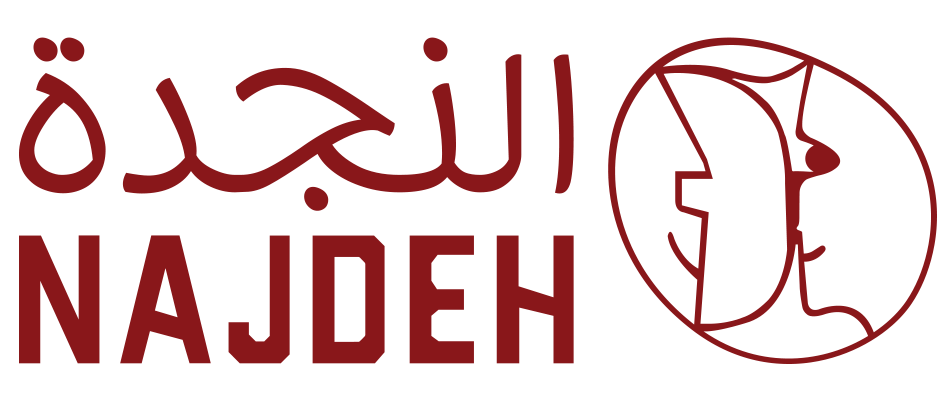Through the project “Enhancing the Protection Strategies for Palestinian Refugees displaced from Syria to Lebanon”, funded by OCHA and Diakonia-Sweden, Association Najdeh in cooperation with Diakonia organization and Issam Fares Institute at the American University, conducted an interactive workshop for media journalists on Tuesday, May 2nd, at the Issam Fares Institute, under the title of “Supporting Human Rights Approaches in Addressing Palestinian Refugees from Syria”.
The workshop was opened by Dr. Nasser Yassin on behalf of Issam Fares Institute. He welcomed the participants in cooperation with Association Najdeh and Diakonia Organization and pointed out the importance of reconsidering and highlighting the legal and humanitarian conditions of the Palestinian refugees from Syria in Lebanon.
“This workshop is part of a series of meetings and workshops that were held and also others to be held with local and international partners on issues related to Palestinian refugees from Syria, which are monitored and identified through observations and documentation of people’s problems within the project,” said Rodolphe Gabriel, Director of Diakonia Office in Lebanon. The project focuses on protection, especially legal issues, in order to present them to national organizations and authorities in order to implement the recommendations proposed in the policies brief on the legal status of Palestinian refugees from Syria in Lebanon.
The Executive Director of Association Najdeh, Mrs. Laila Al-Ali, stressed that the workshop was organized as an attempt to develop a positive approach in dealing with the issues and conditions of the Palestinian refugees from Syria, a comprehensive approach dealing with the Palestinian refugees from Syria to Lebanon not only as numbers or according to humanitarian needs and welfare, But from the perspective of comprehensive inclusive humanitarian and social protection.
She pointed out that the issues in the studies are based on the facts and figures collected during the period of implementation of the project . She stressed to avoid politicizing the case of refugees or displaced people, which is often the case with many local and national political parties, regional and international policies, according to the different interests of the party dealing with the issue.
The workshop discussed two papers entitled “Lost Protection”. The first dealt with the legal status of refugees (especially residency), while the second dealt with the situation of 15-year-olds in Lebanon,
Both papers were finalized during the implementation of the project.
The discussion was moderated by Ms. Carol Mansour, UNRWA’s Protection Unit, while Advocate Manar Zaaiter presented the two policy papers that focused on the following:
- The legal status paper refers to the procedures of entry and renewal of residency in the absence of clear memoranda and decisions, which leaves space for unambiguous and unclear procedures, in addition to the high cost of renewing residence beyond the capacity of refugees to pay, Access to health, education, etc.
The paper recommended issuing and circulating clear guiding memos and applications for Palestinian refugees displaced from Syria, as well as exempting them from fees and ensuring the registration of births, deaths, marriage contracts and other papers that might affect the course of refugees’ lives. The paper also presented recommendations to UNRWA to develop the role of the protection department and strengthen the role of the Agency in terms of advocacy, and call on the media to ensure the accuracy of the information published, and to promote media advocacy for human rights’ issues.
- The second paper entitled “The situation of children who have reached the age of fifteen” dealt with administrative and legal obstacles to Palestinian children from Syria over the age of 15 years during their stay in Lebanon. They must have a Syrian identity card (the child must be present with a guardian in Syria in order to take fingerprints and obtain an ID from Syria) or obtain a passport (to be issued by the Syrian Embassy in Lebanon with a cost of approximately $ 400 per passport). Either ways, it is almost impossible to obtain the necessary documents to settle the legal status of children.
The paper focused on the repercussions of this legal situation on children over the age of 15, especially in relation to being subjected to arrest and detention, limiting their freedom of movement, dropping out of school and leaving school, etc. The paper presented recommendations to the Lebanese state calling for giving children over the age of 15 the right to legal residence without requiring them to obtain an ID from Syria but on the basis of the individual registration ID and making it free of charge; and not arresting and deporting Palestinian refugee children from Syria.
In addition to enrollment of the refugee children’ situation on the agenda of the Lebanese and Palestinian political consultations, the call for activation of the Law of the Protection of Juveniles and the role of the Higher Council for Childhood.
The paper also included an invitation to UNRWA and the international community to work on ensuring the protection of children, to provide all means of humanitarian and social protection for them, and not to endanger them on both legal and security levels.
The workshop included live testimonies of a group of Palestinian refugees from Syria who came to Lebanon. In addition to presenting three short videos containing the experiences of people who experienced legal problems and difficulties
